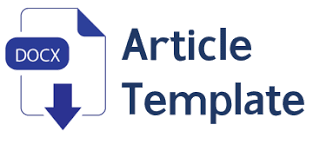Analisis Keterampilan Berpikir Kritis Siswa Melalui Pendekatan Pembelajaran Berbasis Masalah
DOI:
https://doi.org/10.010125/c581ve44Keywords:
Critical Thinking Skills, Problem -Based LearningAbstract
Critical thinking skills are essential competencies that must be possessed by students in facing the challenges of the 21st century. The Problem Based Learning Approach (PBL) is considered an effective method of developing this skill. This study aims to analyze students' critical thinking skills through the application of PBL in Junior High Schools in Cepu, Indonesia. This type of research is quantitative research with a quasi-experimental experimental approach. The data source in this study was a class VIII student of the two classes randomly selected as an experimental group and the control group. Data is collected using critical thinking skills tests given before and after pre-test (pre-test and post-test). The purpose of this study is to identify the extent to which the application of PBL can improve students' critical thinking skills. The results showed that there was a significant increase in students' critical thinking skills in the experimental group compared to the control group. The average post-test score of the experimental group increased significantly from 55 to 78, while the control group only increased from 56 to 62. T-test statistical tests showed a significance value of 0.001 (p <0.05). The results of this study support constructivist theory and social learning theory that emphasizes the importance of active learning and social interaction in the learning process. The application of PBL has proven effective in developing students' critical thinking skills, so it is recommended for educators to implement this method in their learning.
Downloads
References
Aslan, S., & Aybek, B. (2024). Development of Critical-Thinking Skills Rubric within the Scope of Multicultural Education. Educational Process: International Journal, 13(3), 139-158. https://doi.org/10.22521/edupij.2024.133.8
Ennis, R. H. (2016). Critical Thinking Across the Curriculum: A Vision. Rowman & Littlefield Publishers.
Faricha, F., & Sariman, S. (2024). PERAN LEMBAGA PENDIDIKAN ISLAM PADA DALAM MEMBENTUK GENERASI MUSLIM YANG KOMPETITIF. Al Fattah Ejournal Sma Al Muhammad Cepu, 5(02), 36–57.
Haryono, E., Suprihatiningsih, S., Septian, D., Widodo, J., Ashar, A., & Sariman, S. (2024). New Paradigm Metode Penelitian Kepustakaan (Library Research) di Perguruan Tinggi. An-Nuur, 14(1).
Hasyim, F., Prastowo, T., & Jatmiko, B. (2024). Quality of Critical Thinking-Independent Learning (CTIL) Model and Learning Materials to Improve Students’ Critical Thinking Skills in Applied Science Education. AIP Conference Proceedings, 3116(1), 060046. https://doi.org/10.1063/5.0210460• Facione, P. A. (2015). Critical Thinking: What It Is and Why It Counts. California Academic Press.
Haryono Eko Rangkuti Rizki Kurniawan, Sariman, S. S. (2024). Metodologi Penelitian Kualitatif dan Kuantitatif . Https://Www.Rcipress.Rcipublisher.Org/Index.Php/Rcipress/Catalog/Book/949. Perkumpulan Rumah Cemerlang Indonesia.
Muttaqin, F. Z., Khasanudin, M., & Sariman, S. (2022). Learning Management Strategies to Improve the Quality of Education in Senior High School. Scaffolding: Jurnal Pendidikan Islam Dan Multikulturalisme, 4(2), 12–24. https://doi.org/10.37680/SCAFFOLDING.V4I2.1415
Naim, A., & Sariman, S. (2022). Internalization of Character Values in Through the Learning of Ta’līm Al-Muta’allim Book. Scaffolding: Jurnal Pendidikan Islam Dan Multikulturalisme, 4(2), 25–40. https://doi.org/10.37680/SCAFFOLDING.V4I2.1407
Paul, R., & Elder, L. (2019). Critical Thinking: Tools for Taking Charge of Your Learning and Your Life. Pearson.
Sariman, S., Haryono, E., Wahyudin, M., & Muttaqin, F. Z. (2024). Exploring Research Methodologies Qualitative In Higher Education: Strategies And Approaches For Academic Inquiry. Al Fattah Ejournal Sma Al Muhammad Cepu, 4(01), 74–103. Retrieved from https://www.ejournal.smaamc.sch.id/index.php/belajar/article/view/43
Wei, J., & Li, H. (2024). A Systematic Review of Critical Thinking Development in Information and Communication Technology-Supported English as a Foreign Language Teaching from 2015 to 2024. Forum for Linguistic Studies, 6(6). https://doi.org/10.30564/fls.v6i6.7478
Downloads
Published
Issue
Section
License
Copyright (c) 2025 Yusrol Hana (Author)

This work is licensed under a Creative Commons Attribution 4.0 International License.






